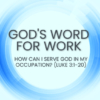John the Baptist Teaches Workplace Ethics (Luke 3:8-14)
Bible Commentary / Produced by TOW Project.jpg)
Much of Luke consists of Jesus’ teaching. As it happens, the first teaching in Luke is directly about work, although it comes from John the Baptist rather than Jesus. John exhorts his audience to “bear fruits worthy of repentance” (Luke 3:8) lest they face judgment. When they ask specifically, “What then should we do?” (Luke 3:10, 12, 14), John gives economic, not religious, responses. First, he tells those who have an abundance of possessions (two tunics or ample food) to share with those who have nothing (Luke 3:10). He then gives instructions to tax collectors and soldiers, relating directly to their work. Tax collectors should collect only what they are required to, rather than padding the tax bill and pocketing the difference. Soldiers should not use their power to extort money and accuse people falsely. They should be content with their pay (Luke 3:13-14).
Discipleship Insight From the TOW Bible Commentary on Luke 3 |
When John tells the tax collectors, “Collect no more than the amount prescribed for you” (Luke 3:13), he was speaking radical words to a profession marked by entrenched, systemic injustice. Taxes throughout Palestine were gathered through a system of “tax farming” in which governors and other high-level officials outsourced the right to collect taxes in their jurisdictions.[1] In order to win a contract, a prospective tax collector would have to agree to give the official a certain amount over and above the actual Roman tax. Likewise, the tax collectors’ own profits were the amounts they charged over and above what they passed up to the governmental officials. Since the people had no way to know what the actual Roman tax was, they had to pay whatever the tax collector assessed them. It would have been hard to resist the temptation for self-enrichment, and almost impossible to win bids without offering fat profits to the governmental officials.
Notice that John does not offer them the option to stop being tax collectors. The situation is similar for those Luke calls “soldiers.” These are probably not disciplined Roman soldiers but employees of Herod, who at that time ruled Galilee as a client king for Rome. Herod’s soldiers could (and did) use their authority to intimidate, extort, and secure self-gain. John’s instruction to these workers is to bring justice to a system deeply marked by injustice. We should not underestimate how difficult that would have been. Holding citizenship in God’s kingdom while living under the rule of kings of the fallen world can be dangerous and difficult.
Also notice that tax collectors and soldiers respond to John’s announcement of God’s judgment by asking, “What should we do?” They ask this question as groups (“we”) sharing the same occupation. Could occupational groups today do the same?
- school teachers asking, “What should we do?”
- business executives asking, “What should we do?”
- grocery store clerks asking, “What should we do?”
- office workers asking, “What should we do?”
The text invites us to understand God’s intent for our specific work, not only for work in general. How might we, in our present occupation, respond to the call of the Gospel?
In the passage a religious leader—the prophet John the Baptist—develops enough credibility with groups of workers—tax collectors and soldiers—that they are willing to invite his input into their ethics at work. Can groups of workers today find help from religious leaders–or from people with biblical/theological capability among themselves—to mutually discern what God intends in their own occupations? Jesus himself promises to guide those who gather together for guidance, “for where two or three are gathered in my name, I am there among them” (Matthew 18:20).
“The Equipping Church” article explores how churches can help workers in common occupations recognize and act on God’s intent for their work.






